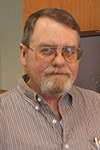Media center technician finds second career at UHV
The proliferation of online classes has been the biggest change Michael Guion has witnessed since starting work at the Victoria College/University of Houston-Victoria Library 17 years ago.
Guion, a media center technician, interacts not only with the public, but also with students on campus and those studying overseas.
“Some students never meet their instructor in person anymore,” he said. “We have some faculty members who teach online and live in Austin. The business school has students overseas in China and Japan.”
Guion, 65, recently celebrated his 20th anniversary as a UHV staff member. But working in higher education wasn’t his original field.
His background is in newspaper production. Guion worked at the Houston Post newspaper from 1971 to 1988, where he went through the apprenticeship program to become a journeyman photoengraver. He also worked at the San Antonio Light from 1988 to 1993.
After the Light closed in 1993, Guion went back to school, first at Victoria College and then at UHV. He needed to find a new job that’d didn’t involve newspaper skills. He graduated from UHV in 1998 and worked at the UHV Help Desk from 1998 to 2000. He then moved to the library, where he has archived thousands of documents.
“Most of these documents and records came from the Regional History Center,” he said. “The tapes are old and fragile. We want to preserve them, so I convert them into a digital format by burning them to a disc, either a CD or DVD. Then we can store the original tape in a secure location. If someone wants to access it, they can check out the disc. If the disc gets damaged for some reason, I can usually make another one.”
The resources often are used in genealogy.
“People are researching family trees,” Guion said. “We have birth records and death notices from old newspapers.”
Guion also maintains the library’s microfiche and microfilm readers, which experienced a surge in use with the Eagle Ford Shale oil boom.
“People from Cuero and DeWitt County were coming here because we had those records,” he said. “The Cuero Library had them too, but because the lines were so long from people researching old land grants and deeds, they drove to Victoria and got easier access. That was probably the biggest surge in activity for quite some time.”
Guion also does encoding for the Panopto system, which is used for online classes. He also helps stream videos.
“When we have some kind of audio or video equipment that malfunctions or fails, I get called in to troubleshoot to see if I can get it working,” he said. “So much of everything is on the internet and online. They don’t use the old resources of the actual tapes and DVDs anymore.”
In addition to audio/video materials, students need quiet rooms in which to study, Guion said. The media center where he works checks out Chromebook laptops equipped with 10-foot HDMI cables that can be attached to large monitors for study groups.
Overall, Guion enjoys the variety of people he meets and services he provides at the library.
“I don’t sit at a desk in front of the computer all day long,” he said. “I was not made for that. I get to get up, and move around and do various things.”
Staff Feature is an online profile highlighting staff members at the University of Houston-Victoria. To nominate a staff member, contact Jeremy Shapiro, UHV communications manager, or call 361-570-4296.
The University of Houston-Victoria, located in the heart of the Coastal Bend region since 1973 in Victoria, Texas, offers courses leading to more than 80 academic programs in the schools of Arts & Sciences; Business Administration; and Education, Health Professions & Human Development. UHV provides face-to-face classes at its Victoria campus, as well as an instructional site in Katy, Texas, and online classes that students can take from anywhere. UHV supports the American Association of State Colleges and Universities Opportunities for All initiative to increase awareness about state colleges and universities and the important role they have in providing a high-quality and accessible education to an increasingly diverse student population, as well as contributing to regional and state economic development.
Melony Overton, special to UHV







